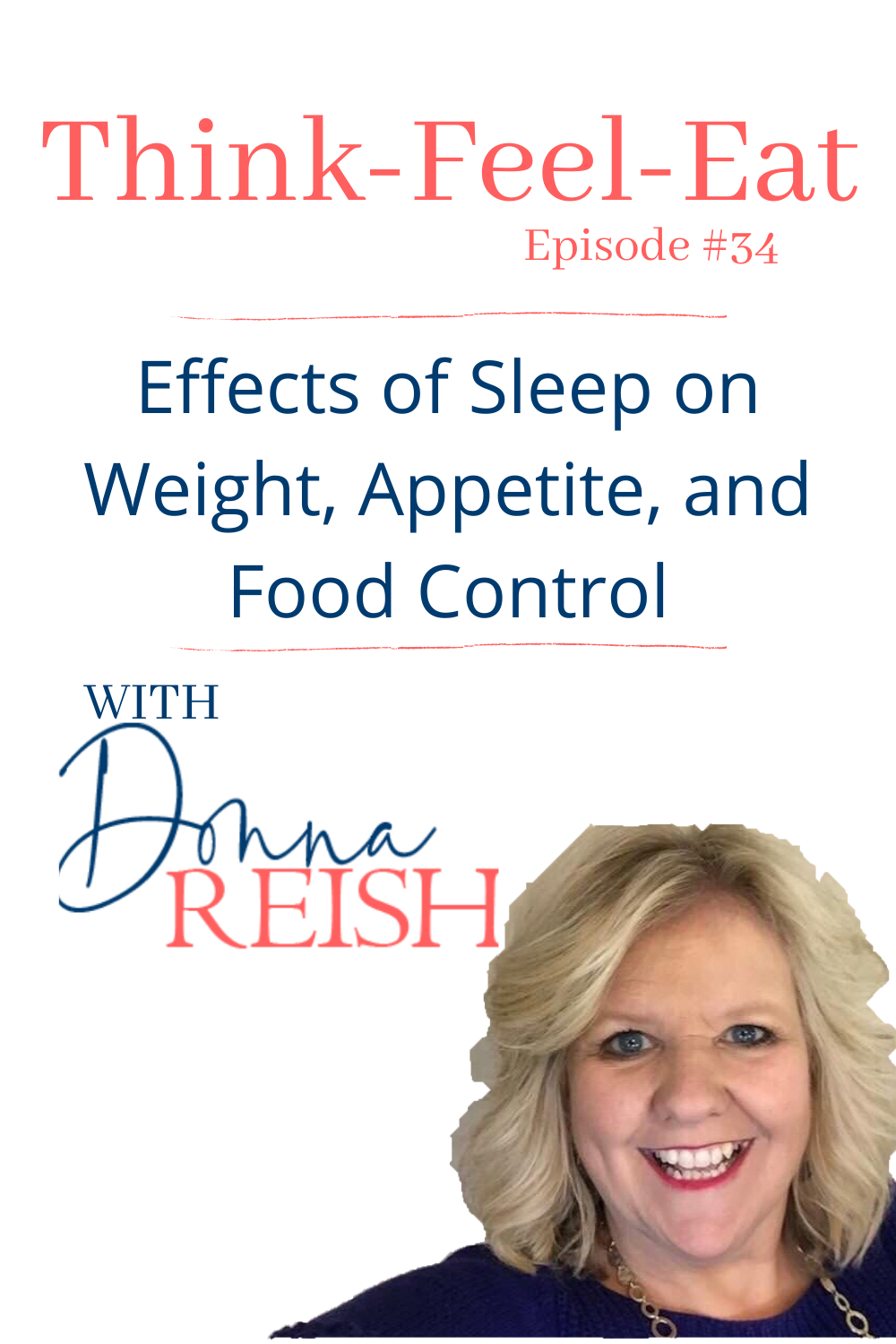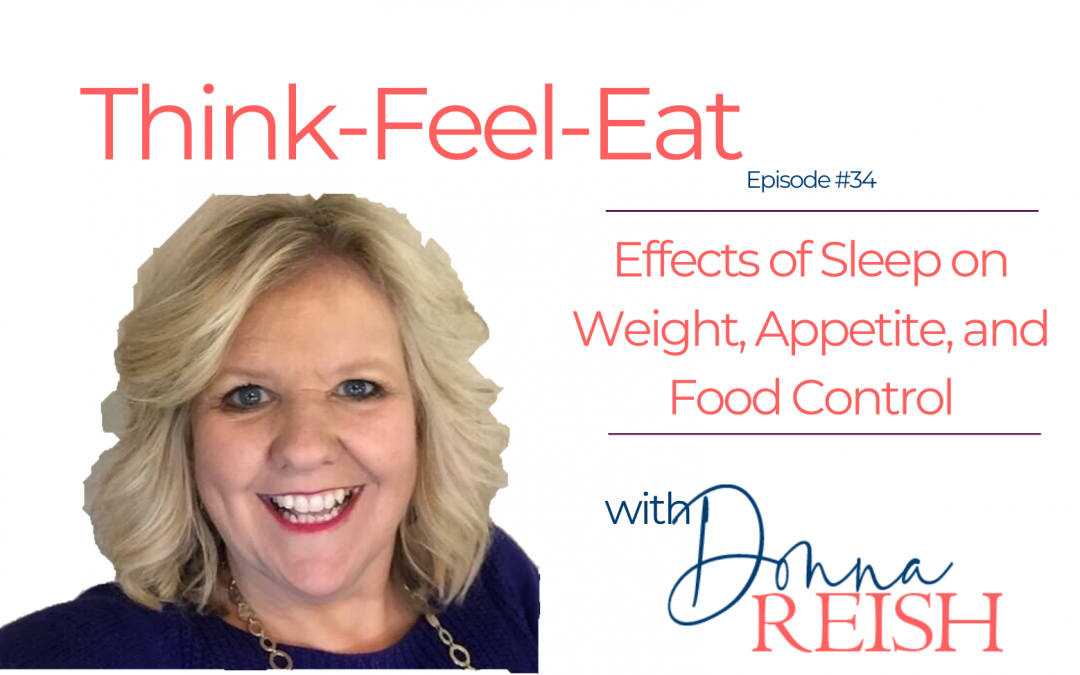Hi! I’m Donna Reish, IF teacher, weight loss coach, blogger, and half of “The Minus 220 Pound Pair” as my husband and I have lost over 220 pounds together (160 of that in the past couple of years through the Weight Loss Lifestyle habits and strategies I teach!).
In this episode, I present important information about the effects of sleep on weight, appetite, and food control.
I begin with general sleep details, such as the need we have for seven to nine hours of sleep and the fact that it is estimated that 35% of people are sleep-deprived. And something that many people do not understand: we thwart our sleep-inducing signals with many things besides caffeine or blue light; things like sleeping too much during the day, being sluggish or inactive; lying around a lot can all lead to sleep disruption. (We think we need to “rest” because we are tired, but we are potentially messing up our sleep that night.)
Of course, we also have many benefits to adequate sleep (again, 7-9 hours), such as fewer cravings, boost in metabolism, better insulin sensitivity, hunger hormone regulation, lower cortisol (stress hormone) levels, and more.
I shared many in-patient/in-center studies on sleep and its effect on things related to hunger, appetite, and even metabolism. (For a more thorough look at sleep, including this research, how to help yourself sleep better, and more, check out Weight Loss Lifestyle 40, 41, and 42.)
Turns out, when we don’t get enough sleep, we choose more calorie dense, nutrient-poor foods; we overeat in total intake; we eat more sweets; and our metabolism actually slows down!
As one of the researchers in the studies concluded, “When you have inadequate sleep, you’re probably less likely to live in accordance with your own health goals. You’re less likely to get to bed on time, you’re less likely to go to the gym, and you’re less likely to have your eating behaviors align with your long-term health goals.”
Think Feel Eat Outline 34: Effects of Sleep on Weight, Appetite, and Food Control
A. Introduction
1. Two Episodes: #34–Sleep; #35–Stress
2. It’s not too late to join the Drop 8 Pounds by Christmas Challenge!
a. Join the blog to get all the email updates and trainings!
c. Watch the short video here:
B. General Sleep
1. Deep details of sleep, circadian rhythms, helping your body go to sleep, effect of sleep on hormones, etc. in Weight Loss Lifestyle 40, 41, and 42
2. Need 7-9 hours a night
3. According to Centers for Disease Control and Prevention, 35% of people are sleep deprived!
4. 29% of adult Americans get six hours or fewer per night (22% in 1985)
5. Over 9 hours for people over the age of 18 often results in depression (or may indicate a sign of existing depression).
6. Causing ourselves to go to sleep
a. We have sleep-inducing signals that accumulate in the brain the longer we are awake, the harder we work, and more we exert ourselves, etc.
b. We often thwart this system with caffeine, blue light, too little activity, staying in a slow state (i.e. laziness), sleeping too much during the day, etc., so that the signal is not perceived as “off” and “on” anymore.
C. Benefits of Adequate Sleep—7-9 Hours
1. It leads to fewer cravings
2. It provides a boost in metabolism
3. It gives you better insulin sensitivity
4. Leads to more regulating of hunger hormones (ghrelin and leptin)
5. Helps you have better workouts
6. Way less stress hormone (cortisol—a hormone that increases hunger and cravings, and much more!)
D. Detriments of Inadequate Sleep
1. Inadequate sleep has been shown in study after study to negatively affect weight management
a. Sleeping six hours or fewer affects ghrelin and leptin (hunger and satiation hormones)
i. Studies show that sleeping under six hours results in lower leptin levels, higher ghrelin levels, and a distinct trigger in the brain requiring more food.
ii. One study showed that just sleeping one to two hours less caused a 24-30% increase in hunger
iii. Another study showed that people who regularly sleep fewer than seven hours have 26% more hunger than people who sleep closer to eight hours per night.
2. Decreased fat loss
a. A study on obese women at the same caloric intake had great fat loss until they divided the groups in two and the second half reduced their sleep
b. Sleep deprived group had half the fat loss from that point on from the other group (with no caloric or energy expenditure changes)
c. Research shows a 55% reduction in fat loss for sleep-deprived people.
3. Brain studies
a. New York Obesity Research center of Columbia University study
i. Study basis: five consecutive nights; nine hours in bed for half; four hours in bed for other half; both slept in lab; monitored with polysomnography (electrodes and wires monitoring brain waves and other sleep indicators)
ii. It was a crossover design—meaning each participant did both sides (good for comparing each person against himself and increases validity of study)
iii. 5th day—allowed to eat whatever they wanted for a day as long as research team weighed and recorded everything
iv. Conclusion: Sleep deprived group ate nearly 300 more calories than the rested ones.
v. Conclusion: “…..sleep restriction increases food intake. It’s as simple as that.”
b. Brain studies show insufficient sleep’s detriments on food choices
i. Same study as above from Columbia University also studied effect on food choices
a. Brain scans showed that sleep restriction increases the brain’s responsiveness to food
b. Parts of the brain associated with food reward were more active in sleep-restricted people (which made them choose more calorie dense, junk foods)
c. Brain studies show insufficient sleep’s detriments on metabolism
i. Same study from Columbia University
ii. Went on to study the “lipostat”—that part of the brain that tells the body how much food it needs
iii. Sleep deprived people are told by their brain that they need more food—more energy (probably because of underlying fatigue)
iv. Lipostat thinks you need more energy, signals the food reward part of the brain to tell you to eat more/get more energy
4. Sleep deprivation leads to lack of impulse control (and lack of food control)
a. Researchers have found that economically people who are sleep deprived have something called optimism bias—they think things will work out for them more easily and make poor choices in gambling and other financial decisions.
i. One team studied 50 people to see if this optimism bias affected food decisions also
ii. They had them sleep different amounts and observed their snack habits (very controlled at a center).
iii. Sleepier people munched on more calories AND were more likely to eat food they had rated as delicious and unhealthy
iv. The researcher concluded, “When you have inadequate sleep, you’re probably less likely to live in accordance with your own health goals. You’re less likely to get to bed on time, you’re less likely to go to the gym, and you’re less likely to have your eating behaviors align with your long-term health goals.”
b. Similar research shows that one night of total sleep deprivation reduces the food cue responsiveness—in other words, even one night of sleep deprivation can cause us to abandon our healthy food goals!
D Work With Me!













